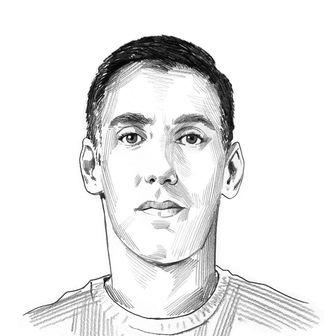
Things probably did not go as expected last week for Emily Kohrs, the foreperson of the Fulton County grand jury that investigated Donald Trump and his allies’ efforts to overturn Georgia’s 2020 presidential-election results.
As you might have heard, Kohrs gave a series of interviews to television and print outlets about the grand jury’s work that suggested, among other things, that the jurors had recommended that Trump be criminally charged. Under ordinary circumstances, if you predict that Trump will be criminally charged, or appear to be someone who might facilitate his imprisonment, you can become an instant media hero. In Kohrs’s case, she was almost immediately raked over the coals by members of the media and legal commentariat who questioned whether she had violated grand-jury secrecy rules or perhaps even tanked the DA’s office’s potential case against Trump by talking about it.
This made little sense for a variety of reasons, but you no longer have to take it from me. The judge who ordered the limited release of the grand jury’s report weighed in this week after ABC News asked him what he thought about the whole dustup, and he largely shut down the criticism — explaining that, under Georgia law, the jurors could not publicly discuss their “deliberations” but were free to “talk about witness testimony,” “about things that the assistant district attorneys told” them, and “about the final report.” Given the precipitating media freak-out, the judge punctuated the point rather unsubtly, concluding that “folks should think long and hard about what impact, at all, this special-purpose grand jury’s work would have should there be an indictment down the road.”
There are several reasons for this. Even in the federal system, it is virtually impossible to get a case thrown out based on the conduct of grand jurors unless there is serious reason to believe that they based their decision on materially flawed legal instructions or improper factual considerations (like the prospective defendant’s race). Nothing Kohrs said suggested anything like that. More important, Kohrs was on a special investigative grand jury, so if Fulton County district attorney Fani Willis proceeds to indict Trump, that indictment would be presented for approval to an entirely separate grand jury. So even if Kohrs had done anything wrong — and, despite what some observers quickly and confidently claimed, that does not appear to be the case — it is even harder to see how that could legitimately taint the grand jury that has to consider the proposed indictment. (This is to say nothing of the fact that Trump’s case would ultimately be adjudicated by yet another group of jurors: the actual trial jury that would hear the evidence and Trump’s defense before rendering a verdict.)
It is tempting to write this all off as another inconsequential episode in the annals of Trump’s many legal problems, but there are some important lessons for the media to draw here, particularly if Trump is eventually charged by prosecutors in Fulton County or at the Manhattan DA’s office.
To start, federal law is not the same as state law — an obvious point that has nevertheless been repeatedly bungled by the press in the Trump probes. This has mostly happened in the context of the investigation by the Manhattan DA’s office — especially regarding questions about New York’s criminal procedure and the state’s law on financial fraud — but it also appears to have prompted the blowback against Kohrs’s remarks since federal grand juries operate under more restrictive secrecy requirements than those that apply in Georgia. It does not help matters that the vast majority of former prosecutors who provide commentary in this area are, like me, former federal prosecutors with little to no actual experience with state prosecutors’ offices unless we happened to represent clients adverse to them as defense lawyers.
A second and more important lesson to take away is that Trump and his lawyers’ strategy in any criminal prosecution will include spinning credulous reporters in the national and political press, which explains a lot of what happened here. Almost immediately after Kohrs gave her first television interview, Trump’s lawyers were telling political reporters that they would move to dismiss any indictments based on Kohrs’s remarks, but they conspicuously failed — despite multiple unwarranted opportunities to trash Kohrs — to identify an actual legal argument for doing so.
A more insidious strain of argument against Kohrs was that she was flighty and unserious or perhaps that she was angling for the media spotlight. Set aside, if you can, the gendered nature of this criticism or the jaw-dropping irony of the fact that people who have made their public careers incessantly pontificating about Trump’s legal problems could turn around and criticize her, as one did, for conducting a “15-minute PR tour.”
This played right into Trump and his lawyers’ hands. The former president’s legal team will do whatever it can to claim that any prosecution against him is a sham — a witch hunt, a political vendetta, and so on — and not a legitimate effort to hold him accountable for potential criminal misconduct. All it has to do is successfully seed that idea with one person who eventually ends up on the trial jury, and the result could be a mistrial. Any judge at the trial level or in the appellate chain of review who believes this could also derail the process.
This is all bad enough, but there is a larger and more disturbing problem here that is rooted in the critically important fact that Kohrs did not volunteer for the assignment to be on the grand jury.
For the most part, all Kohrs appears to have done was to fulfill her civic duty by sitting on the jury, to respond to media requests concerning her role in a major news story (at least before the media turned on her), and to adhere to the judge’s guidance about what she could and could not say.
The fact that she could be so easily and successfully trashed — and that she has probably faced a deluge of obnoxious and perhaps threatening missives from Trump supporters — is not exactly surprising, but it is worrisome all the same. Anyone sitting on a jury in a prosecution against Trump will be doing so at serious personal, reputational, and possibly even physical risk, particularly if the result is a conviction. The media should not be irresponsibly facilitating attacks on these people, especially when they are baseless, deliberately amplified by Trump and his lawyers, or both.
Criminal prosecutions are inherently adversarial affairs, but they are also, in a very important sense, collective civic endeavors that rely crucially on the participation of everyday Americans to serve on juries. People being people, they are often flawed, and they sometimes behave suboptimally. But they all deserve to be treated fairly and responsibly in the public sphere.
Anything less, at least in this case, is almost certainly a favor to Trump.






























